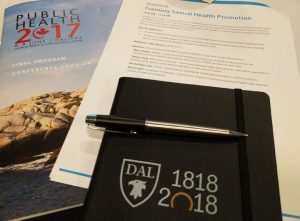By: Crystal Watson, Dalhousie PhD in Health Candidate
Through the support of PLANS (Promoting Leadership in Health for African Nova Scotians) and the Johnson Scholarship Foundation, I recently attended the Canadian Public Health Association (CPHA) Conference. Over the course of the three days, I learned more about Public Health and the vital role it plays. For this blog post, I would like to share a few key learnings that I received through my attendance at this conference and issue a challenge for those of us interested in improving the health of our communities.
Having been my first time attending, I really did not know what to expect. Based on the various session abstracts presented, Public Health is a broad area that challenges us to consider the multi-faceted areas of health – whether they impact the individual directly or indirectly – and how to influence policy. As a health professional and research trainee, knowing how to influence policy through my work will be critical. This will be something that I keep at the forefront of my mind as I proceed through this journey.
What was most impactful for me however, was considering the scientific evidence along with the practical wisdom that is held by our Indigenous people and Elders in our communities. I would also extend this to the Elders in my own African Nova Scotian community. Healthcare providers and researchers need to listen to and understand the experiences of the individuals that we will work with and the communities in which they reside. That said, representation is important! Unfortunately, a localized context for this conference was absent and would have contributed to a stronger conference. For example, the session on Racism in Society did not include a representative from the African Canadian community in Nova Scotia, a population that has a unique experience to share in many areas that this conference discussed including building healthy communities, food security, mental and physical health and so much more. I am hopeful that as the number of ethnically diverse health care professionals increase, that the issues affecting the communities become more mainstream and become priorities for the heath of all Canadians.
I hope that as we strive to improve the health in our communities, that we acknowledge the many factors that lead to the diversity of the people in the communities, age, gender, socioeconomic status etc., and how they factor into how we address the needs of the community. We need their voices to deal with the complex health issues in our communities. That is when we will see a change.
For more information on PLANS please visit our Diversity and PLANS webpages.

Leave a Reply